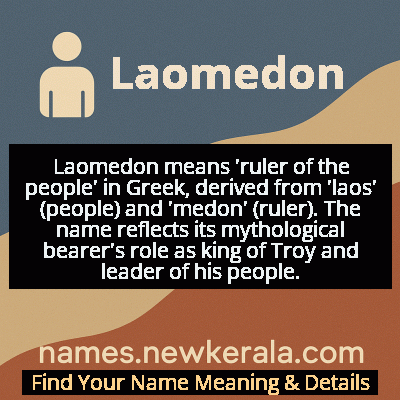Laomedon Name Meaning & Details
Origin, Popularity, Numerology Analysis & Name Meaning of Laomedon
Discover the origin, meaning, and cultural significance of the name LAOMEDON. Delve into its historical roots and explore the lasting impact it has had on communities and traditions.
Name
Laomedon
Gender
Male
Origin
Greek
Lucky Number
7
Meaning of the Name - Laomedon
Laomedon means 'ruler of the people' in Greek, derived from 'laos' (people) and 'medon' (ruler). The name reflects its mythological bearer's role as king of Troy and leader of his people.
Laomedon - Complete Numerology Analysis
Your Numerology Number
Based on Pythagorean Numerology System
Ruling Planet
Neptune (Ketu)
Positive Nature
Intuitive, analytical, spiritual, and inquisitive.
Negative Traits
Secretive, reserved, aloof, and can be overly critical.
Lucky Colours
Green, yellow.
Lucky Days
Monday.
Lucky Stones
Cat’s eye, moonstone.
Harmony Numbers
1, 5, 6.
Best Suited Professions
Scientists, researchers, spiritual leaders, detectives.
What People Like About You
Depth of knowledge, analytical skills, spirituality.
Famous People Named Laomedon
Laomedon of Troy
Mythological King
King of Troy, father of Priam, builder of Troy's walls with Apollo and Poseidon
Laomedon of Mytilene
Ancient Ruler
Ruler of Mytilene who served under Alexander the Great as a companion
Laomedon (Historical Figure)
Military Commander
Mentioned in ancient texts as a commander during the Wars of the Diadochi
Name Variations & International Equivalents
Click on blue names to explore their detailed meanings. Gray names with will be available soon.
Cultural & Historical Significance
Extended Personality Analysis
The name Laomedon suggests a personality characterized by grand ambition and strategic vision, reflecting the mythological king's drive to construct one of the ancient world's most famous fortified cities. Individuals with this name might exhibit strong leadership qualities and organizational capabilities, capable of inspiring others to undertake massive projects. However, this ambitious nature may be shadowed by a tendency toward cunning and opportunism, as seen in the original Laomedon's willingness to deceive even gods when it served his purposes. The name implies a complex moral character where great achievements are potentially undermined by ethical compromises, creating a personality that commands respect but may struggle with trust and long-term loyalty. Such individuals likely possess the charisma to lead but must consciously cultivate integrity to avoid the tragic flaws associated with their namesake.
Modern Usage & Popularity
In contemporary naming practices, Laomedon remains an extraordinarily rare choice, primarily confined to academic families, classical scholars, or those with specific interest in Greek mythology. The name has never achieved significant popularity in modern birth records and is more commonly encountered in historical and literary contexts than as a personal identifier. Its complexity, both in pronunciation and mythological associations, has prevented widespread adoption, particularly as it carries connotations of deception and divine punishment from its mythological origins. While there has been a general resurgence of interest in classical names in recent decades, Laomedon has not benefited from this trend to the same extent as names like Alexander or Hector, remaining a specialist choice for those seeking deeply historical but morally complex mythological references.
Symbolic & Spiritual Meanings
Symbolically, Laomedon represents the profound Greek concept of the flawed leader whose grand visions are ultimately compromised by moral weakness. The name serves as a metaphor for the tension between human achievement and ethical integrity, where even the most impressive accomplishments—like building Troy's legendary walls—can be nullified by character defects. It embodies the idea that foundations, whether of cities or personal legacies, require not just physical strength but moral fortitude to endure. The symbolic meaning extends to warnings about the consequences of broken trust and the inevitable reckoning that follows deception, particularly toward those in positions of power. As such, Laomedon stands as a powerful symbol of the classical understanding that human greatness and human failing are often two sides of the same coin, with destiny shaped as much by character as by capability.

